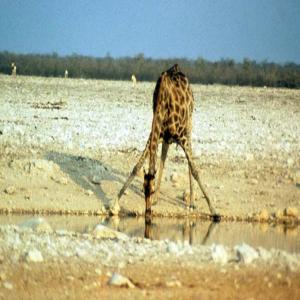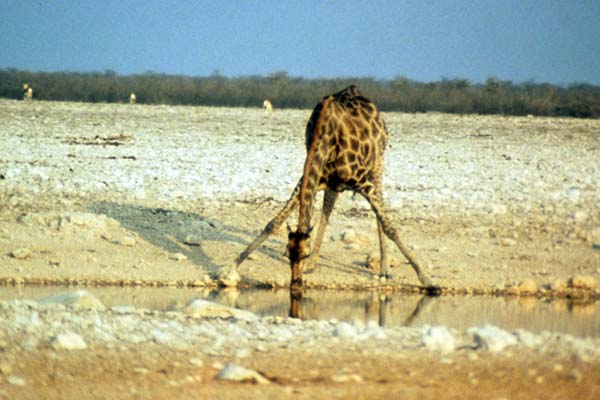Episodes

Wednesday Mar 09, 2016
Wednesday Mar 09, 2016
Go behind the scenes of a pangolin rescue with Thai Van Nguyen, founder and executive director of Save Vietnam's Wildlife, and Gillian Foster, the organization's Communications Advisor. Save Vietnam's Wildlife is the first Vietnamese NGO dedicated to saving pangolins. Pangolins are arguably the world's most trafficked mammal, with an estimated 100,000 captured each year. People hunt them for their meat and their scales, which are used in traditional Asian medicine. Vietnam has two of the eight pangolin species, Sunda and Chinese pangolins, both critically endangered. In just eight months (July 2015-February 2016), Save Vietnam's Wildlife rehabilitated and released 75 pangolins rescued from the trade.

Monday Aug 25, 2014
Monday Aug 25, 2014
Since she was in 6th grade, Rhiannon Tomtishen has been passionate about orangutans. As a Girl Scout, that passion led her to fight for deforestation-free palm oil together with her friend Madison Vorva. The story of these two girls inspires young and old alike and shows how simple actions can make a big difference. Now 19 years old, this eloquent young women shares her experience and advises us all to follow our passion.

Tuesday Jan 28, 2014
Tuesday Jan 28, 2014
Kevin Bewick, head of the Anti-Poaching Intelligence Group of Southern Africa (APIGSA), provides his perspective on the fight against wildlife crime. His group undertakes investigations and focuses on intelligence gathering and research into wildlife poaching and trafficking.

Thursday Apr 18, 2013
The WildLife: CITES CoP16 Outcomes, CITES Secretary-General John Scanlon
Thursday Apr 18, 2013
Thursday Apr 18, 2013
John Scanlon, Secretary-General of the Convention on International Trade in Endangered Species (CITES), provides his perspective on the major outcomes of CITES 16th Conference of Parties, which was held in Bangkok, Thailand from March 3-14, 2013. The conversation covers overarching issues, such as enforcement, financing and political engagement, as well as species-specific items, including timber, sharks and elephants.

Sunday Feb 24, 2013
The WildLife: CITES Secretary-General John Scanlon
Sunday Feb 24, 2013
Sunday Feb 24, 2013
John Scanlon, Secretary-General of the Convention on International Trade in Endangered Species (CITES), reflects on the 40th anniversary of CITES, provides an overview of what to look for at the 16th Conference of Parties, and discusses species-specific issues, with an emphasis on elephants, rhinos and sharks.

Thursday Feb 21, 2013
The WildLife: A Lifetime with Elephants, Iain Douglas-Hamilton
Thursday Feb 21, 2013
Thursday Feb 21, 2013
Iain Douglas-Hamilton reflects on a lifetime studying elephants and discusses the current surge in ivory poaching. At age 23, Iain Douglas-Hamilton pioneered the first in-depth scientific study of elephant social behavior in Tanzania's Lake Manyara National Park. During the 1970s he investigated the status of elephants throughout Africa and was the first to alert the world to the ivory poaching holocaust. He and his wife have co-authored two award-winning books and have made numerous television films. In 1993, he founded Save the Elephants, a Kenyan conservation organization dedicated specifically to elephants. In 2010, he was named the recipient of the prestigious Indianapolis Prize, in recognition for his lifetime achievements.

Monday Feb 18, 2013
The WildLife: Celia's Campaign Against the Elephant Ivory Trade, Celia Ho
Monday Feb 18, 2013
Monday Feb 18, 2013
Fourteen-year-old Celia Ho from Hong Kong recently launched a campaign to stop the ivory trade after becoming inspired by Bryan Christy’s “Blood Ivory” article in National Geographic magazine. Her young voice represents a new hope for elephants that is increasing throughout Asia while her story illustrates how one person can make a difference.

Sunday Sep 11, 2011
The WildLife: Nature Iraq, Anna Bachmann and Hana Ahmed Raza
Sunday Sep 11, 2011
Sunday Sep 11, 2011
Anna Bachmann, Director of Conservation for Nature Iraq, and Hana Ahmed Raza, their mammal specialist, discuss wildlife and nature in Iraq. They tell "The WildLife" host Laurel Neme, how, after 35 years of wars and sanctions, Iraq's environment is in dire need of care and attention. In order to rebuild the country's natural foundation, more information is needed, and Nature Iraq aims to fill some of those gaps. This episode originally aired on March 28, 2011 and was reposted on September 12, 2011.

Monday Aug 29, 2011
The WildLife: The Secret Life of Seahorses, Helen Scales
Monday Aug 29, 2011
Monday Aug 29, 2011
Helen Scales, author of Poseidon’s Steed: The Story of Seahorses from Myth to Reality, reveals the unusual anatomy and strange sex lives of seahorses. She tells “The WildLife” host Laurel Neme that seahorses live mysterious lives, tucked away out of sight on the seafloor, and provides insights into their strange characteristics, including: kangaroo-like pouches for the males to bear the young, horse-like snouts used like straws to suck in tiny zooplankton, prehensile tails to grasp sea grasses, swiveling chameleon eyes and color-changing skin. Seahorses face many threats, including habitat loss and degradation and commercial trade. They’re used in traditional Asian medicine, and also sold as curios and as aquarium pets. Global consumption of seahorses is massive, with about 25 million seahorses sold each year. There’s so much we still don’t know about seahorses. For instance, we’re not even sure how many different species there are.
Dr. Helen Scales is a marine biologist, writer, and broadcaster who specializes in fisheries, habitat protection, and the international trade in endangered species. She has lived and worked in various countries and now lives in Cambridge, England where she works as a consultant for a number of conservation groups including the International Union for the Conservation of Nature, Natural England, and TRAFFIC International. For her PhD from the University of Cambridge she studied the loves and lives of one of the biggest coral reef fish, the Napoleon wrasse, and its imperiled status due to demand from Asian live seafood restaurants.She appears as a radio host on the BBC’s The Naked Scientists show and on BBC Radio 4’s Home Planet. She also produces and presents a new podcast series, Naked Oceans, a fun and informative exploration of the undersea realm. In her first book, Poseidon’s Steed: The Story of Seahorses from Myth to Reality, she explores humankind’s thousand-year fascination with seahorses. This episode of “The WildLife” originally aired on The Radiator, WOMM-LP, 105.9 FM in Burlington, Vermont on January 17, 2010. It was reposted on August 22, 2011.

Monday Aug 22, 2011
The WildLife: Primate Smuggling and Tarantula Trade, David Kirkby
Monday Aug 22, 2011
Monday Aug 22, 2011
David Kirkby, veteran U.S. Fish and Wildlife Service (FWS) Special Agent, talks about wildlife law enforcement. He tells “The WildLife” host Laurel Neme about two of his most prominent cases: smuggling of primates for research institutions; and Operation Arachnid, an undercover investigation into the illegal trade in tarantulas.
David Kirkby was a US FWS Special Agent for twenty years, from 1988 until he retired in 2008. Raised in North Canton, Ohio, Kirkby worked for years in the federal wildlife refuge system, starting in the west desert of Utah before moving to Montana’s Lee Metcalf Wildlife Refuge, and then the Crab Orchard Wildlife Refuge in southern Illinois. From there, he moved into US FWS’s law enforcement division, first as a wildlife inspector at O’Hare International Airport in Chicago. That helped prepare him for another shift, as a special agent. In 1988, after additional extensive training, he began as a FWS Special Agent, with his first duty station in Montgomery, Alabama. Eventually, Kirkby moved back to Chicago, where he pursued numerous complex multi-year undercover investigations, including ones on primate smuggling and on the pet tarantula trade. This episode of “The WildLife” was posted on August XX, 2011.
The WildLife is a show that explores the mysteries of the animal world through interviews with scientists, authors and other wildlife investigators. It airs every Monday from 1-2 pm EST on The Radiator, WOMM-LP, 105.9 FM in Burlington, Vermont.

